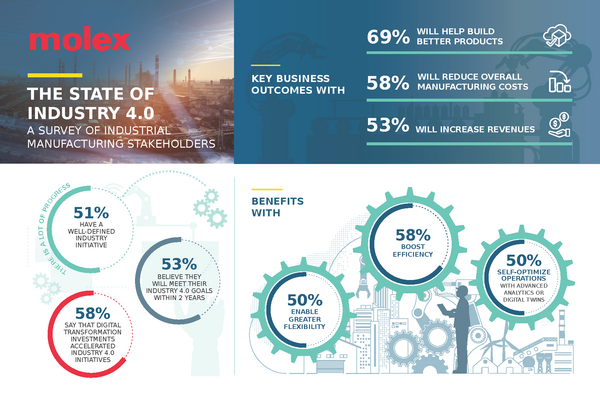Electronics leader Molex has commissioned third-party research firm Dimensional Research to conduct The State of Industry 4.0 Survey in June 2021 to gather in situ data on Industry 4.0 experiences and opinions. The 216 qualified participants come from a variety of industries including R&D, production manufacturing, engineering, strategy, innovation, and supply chain management.
51% of participants say they have a clearly defined corporate priority for Industry 4.0 with management support. 49% of them have already achieved positive results while 21% are still in the investment stage. More than half of those surveyed expect to achieve their goals within two years while a third believe it will take 3 to 5 years to get there. 58% of respondents say digital transformation investments have accelerated their Industry 4.0 efforts and 44% still believe organizational and cultural barriers to adoption are the most difficult to overcome.
The survey shows that the most important business outcomes are the ability to produce better products at 69%, lower overall manufacturing costs at 58%, increase revenue at 53%, offer products at cheaper prices at 35%, and reduce time to market for new solutions at 35%. The prospect of expanding automation and factory floor intelligence is expected to generate significant gains for customers.
In terms of the benefits most expected by customers, the survey reveals 58% for increased efficiency of robots, machines and other manufacturing assets, 50% for greater flexibility on manufacturing lines, 50% also for using advanced analytics or digital twins to self-optimize operations, 42% for virtual design and simulation of new production facilities before making capital expenditures, 41% for increasing workforce productivity, and 26% for unlocking real-time data access in facilities. Overall, 87% of respondents are confident in the transformative capability of Industry 4.0 over the next decade.
The capabilities seen as most beneficial to their company's efforts are machines with high intelligence to control their own processes while interacting externally at 53%, remote access to all production lines and machines at 47%, and multi-purpose connectivity solutions including internet at 40%.
Challenges in culture, business model and technology still need to be overcome
Half of the participants see challenges related to leadership that does not embrace change, making it difficult to get full value from investments. The study also points to other cultural issues hindering success, such as difficulties in finding qualified data and analytics personnel at 35%, organizational structures that limit information and systems sharing at 32%, pilot projects that lack funding and personnel at 30%, and insufficient expertise in connected technologies at 28%.
Other business model challenges remain as well, with reporting difficult funding decisions, 42% stating that upfront investments that hinder ROI, and 40% citing a lack of clarity on the most profitable use cases. The study also reveals numerous technology barriers, with separate network infrastructures for IT and production (43%), restrictive communication protocols (39%), limited remote access (36%), cloud infrastructure and data solutions not tailored to production needs (34%) and inadequate security capabilities (32%). Overall, 85% of respondents believe that a change in executive mindset is fundamental for Industry 4.0 initiatives to move forward.
























































